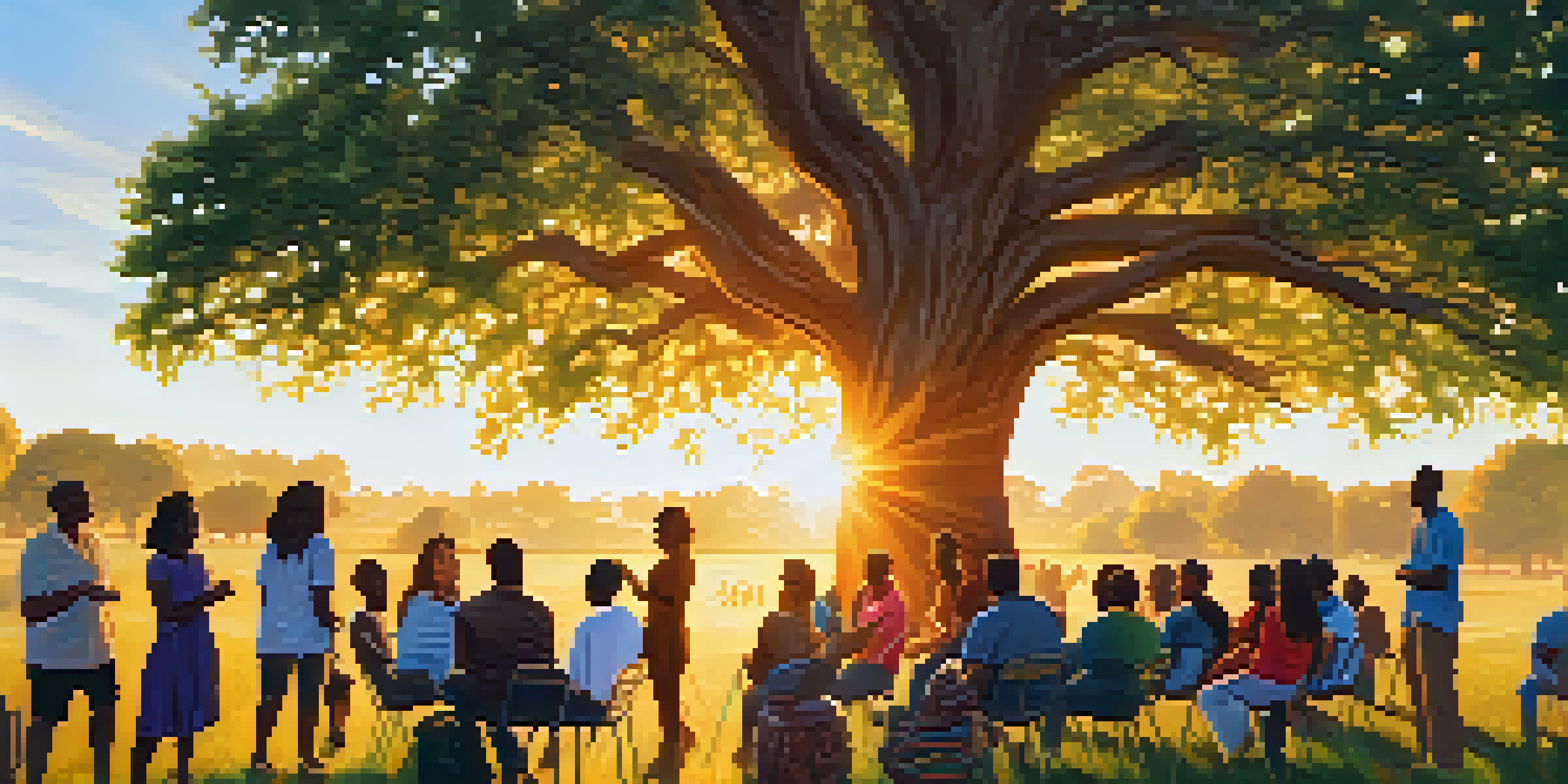Political Turmoil: The Influence on Hollywood Storytelling

The Historical Context of Political Turmoil in Film
Throughout history, political upheavals have often found their way into Hollywood storytelling. The McCarthy era, for instance, saw a wave of paranoia that influenced countless films, pushing creators to reflect the fears of the time. This historical context sets the stage for understanding how filmmakers respond to current events, portraying societal anxieties in their narratives.
The power of storytelling is exactly this: to bridge the gaps where everything else has crumbled.
Similarly, the Vietnam War produced films that challenged viewers’ perceptions of heroism and morality. Movies like 'Apocalypse Now' and 'Platoon' illustrated the chaos of war while critiquing the political motivations behind it. This cycle of reflection and reaction demonstrates how deeply intertwined politics and storytelling can be.
As we navigate modern political landscapes, it's essential to recognize how these historical influences continue to shape contemporary narratives. Today’s filmmakers often draw from past experiences to inform their storytelling, creating a dialogue between history and present-day issues.
Current Events: A Catalyst for Creative Expression
In recent years, major political events have inspired a surge in creative expression within Hollywood. The rise of social media has amplified voices, pushing filmmakers to tackle pressing issues like social justice, immigration, and climate change. This newfound urgency in storytelling has led to a wave of films and series that resonate deeply with audiences.

For example, productions like 'The Handmaid's Tale' and 'Black Mirror' serve as reflections of current societal fears, exploring themes of control, surveillance, and resistance. These shows not only entertain but also provoke thought, encouraging viewers to engage with the political climate around them. It's fascinating to see how fiction can mirror reality in this way.
Political Turmoil Shapes Filmmaking
Filmmakers have historically responded to political upheavals, using storytelling to reflect societal fears and anxieties.
Moreover, these narratives often serve as a means of escapism while simultaneously addressing uncomfortable truths. By engaging with current events through a creative lens, filmmakers can spark conversations and inspire action, proving that storytelling is not just about entertainment but also about influencing change.
The Role of Documentaries in Political Commentary
Documentaries have emerged as a powerful medium for political commentary, offering audiences a real-world perspective on pressing issues. Unlike fictional narratives, documentaries can provide factual evidence and personal stories that highlight the human impact of political turmoil. Films like '13th' and 'Fahrenheit 9/11' challenge viewers to confront uncomfortable truths about systemic issues.
Documentaries are the first draft of history.
These films often serve as a call to action, encouraging audiences to engage with the world around them. By presenting facts and personal narratives, documentaries can reshape public perception and inspire movements. They remind us that behind every statistic is a human story, making the political personal.
As more filmmakers embrace documentary storytelling, we see a shift towards a more informed and engaged audience. This trend highlights the importance of factual storytelling in an age of misinformation, reinforcing the role of documentaries as crucial instruments for social change.
The Impact of Streaming Services on Political Storytelling
The rise of streaming services has transformed the landscape of Hollywood, allowing for more diverse political narratives to emerge. Platforms like Netflix and Hulu provide creators with the freedom to explore complex themes without the constraints of traditional broadcasting. This shift has led to a rich tapestry of storytelling that reflects a variety of political perspectives.
For instance, shows like 'The Politician' and 'The Crown' delve into political ambitions and the intricacies of power. These stories not only entertain but also provoke critical discussions about governance and ethics. Streaming services have made it possible for niche topics to find their audience, fostering a culture of inclusivity in storytelling.
Documentaries Drive Political Awareness
Documentaries provide factual insights into political issues, encouraging audiences to confront uncomfortable truths and engage with social change.
Additionally, the global reach of these platforms allows for an exchange of ideas across cultures. This international perspective can enrich political storytelling, showcasing how different societies navigate their unique challenges. It’s exciting to see how streaming is reshaping not just what stories are told, but who gets to tell them.
The Influence of Activism on Hollywood Narratives
Activism has become a significant force in shaping Hollywood narratives, with filmmakers increasingly aligning their projects with social movements. The growing awareness of issues such as racial inequality, climate change, and LGBTQ+ rights has prompted storytellers to create content that resonates with activist causes. This alignment not only amplifies the messages but also builds a community around shared values.
Films like 'Moonlight' and 'Selma' not only tell compelling stories but also serve as important commentaries on social justice. They remind audiences of the struggles faced by marginalized communities, fostering empathy and understanding. This blend of storytelling and activism encourages viewers to reflect on their own roles in creating change.
Moreover, the participation of celebrities in activism can amplify these narratives, drawing attention to important issues. Celebrities using their platforms to advocate for change can inspire fans and followers to engage with the causes they care about. Hollywood's embrace of activism ultimately creates a powerful synergy between entertainment and social responsibility.
The Future of Political Storytelling in Hollywood
As political tensions continue to rise globally, the future of storytelling in Hollywood looks to be more politically charged than ever. Filmmakers are likely to respond to these challenges with bold narratives that reflect the complexities of modern life. The evolution of technology and media consumption will also play a role in determining how these stories are told and shared.
We can expect to see a blending of genres, where traditional storytelling techniques meet innovative formats, such as interactive films and virtual reality experiences. This could open new avenues for audiences to engage with political narratives in immersive ways, allowing for a deeper understanding of societal issues.
Streaming Expands Political Narratives
The rise of streaming services has allowed for diverse political narratives, fostering inclusivity and enabling creators to explore complex themes.
Ultimately, the relationship between political turmoil and Hollywood storytelling is a dynamic one. As long as there are stories to tell, filmmakers will find ways to reflect the world around them, crafting narratives that resonate and inspire change. The challenge will be to maintain authenticity and relevance in an ever-evolving political landscape.
Conclusion: The Power of Storytelling in Times of Turmoil
In conclusion, the influence of political turmoil on Hollywood storytelling is profound and multifaceted. Through the lens of history, current events, and activism, we see how filmmakers harness the power of narrative to comment on societal issues. This dynamic relationship enriches the cinematic landscape, making it both a mirror and a map of our collective experiences.
As audiences, we have the opportunity to engage with these stories, reflecting on their implications and considering our roles in the wider world. The stories we consume can inspire us to think critically and act compassionately, reminding us that we are all part of a larger narrative.

In times of turmoil, storytelling becomes not only a means of escape but also a tool for understanding and change. As Hollywood continues to evolve, we can look forward to a future where stories remain a vital part of our response to the challenges we face.